Are you off to the land of private paradise resorts, stunning coral reefs, welcoming locals and sun-soaked white shores? Well, if it’s your first time, then there are just a few things you should know before visiting Fiji.
But don’t worry – Fiji is most definitely a country that is geared towards tourism. There’s nothing too shocking or ‘out there’ to know about travelling to Fiji that may surprise you. But as a ‘laid back anxious person’ myself, I personally always find it useful to know first-hand what a place is like before I visit, to ensure I’m as prepared as possible – both physically and mentally!
That being said, I thought I’d share my own insider tips about the things I wish I had known before my trip to Fiji. Or, simply useful things I learnt as I backpacked around during my trip.
So without further ado, here are 15 very useful things to know before visiting Fiji!
*This post may contain affiliate links meaning should you purchase a product via this link, I’ll earn a small commission at no extra cost to you. See my privacy and disclosure policy for more.*
PIN FOR LATER:
15 Very Useful Things to Know About Fiji Before You Visit:
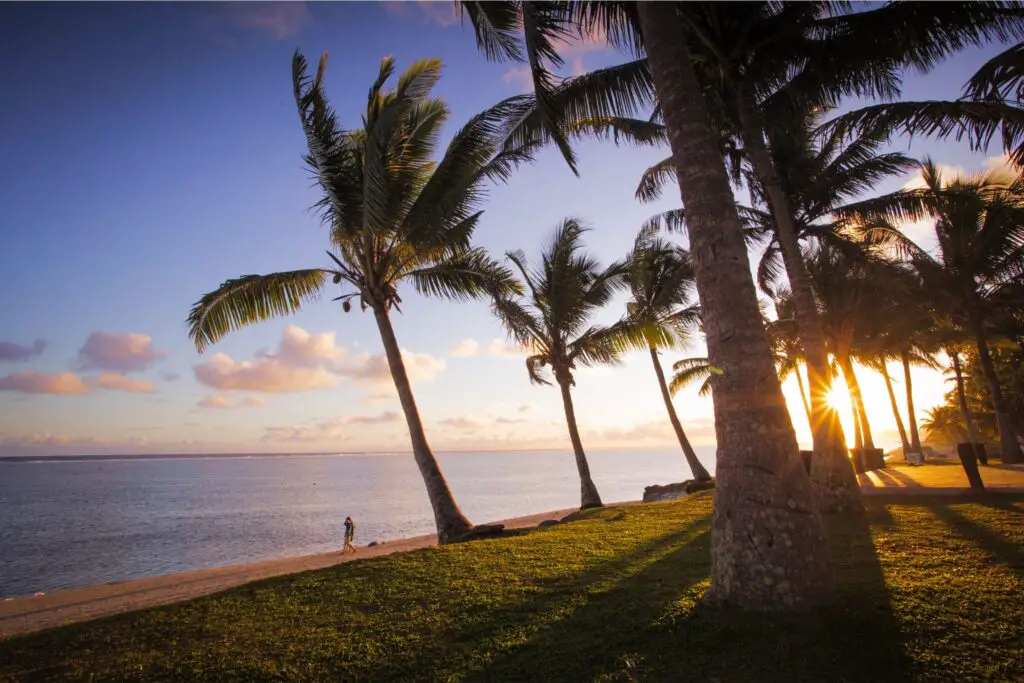
1. It’s not necessarily a ‘cheap’ destination
If you’re used to Bali or other Southeast Asian country islands, then you need to know Fiji in the South Pacific is not as cheap as you may initially think (or expect).
That being said, it’s still extremely reasonable to be a visitor if you put it into perspective. The equivalent accommodation or goods in your home country would likely be much more expensive than Fiji if home is somewhere like Australia, the UK or Canada.
As a rough example of costs in Fiji:
- A Fiji Gold beer – $5-6FJD ($3.50 AUD / £2 GBP / $2.20 USD)
- A nice backpacker hostel (per night) – $55FJD ($37 AUD / £20 GBP / $23 USD)
- A mid-range private bungalow (per night) – $400FJD ($270 AUD / £150 GBP / $170USD)
- A mid-range main meal, like a pizza – $20FJD ($14 AUD / £8 GBP / $9 USD)
Obviously the nicer the accommodation, the more price premium you’ll pay. Either way, accommodation will definitely be the largest cost you’ll face in Fiji, bar the flights.
Considering many of the islands rely on imports from the mainland Viti Levu, including food and household items, you will likely pay more than the above if you stay somewhere a little more remote. For example, if you’re island hopping in the Yasawa Islands.
It’s also good to know that when you’re there, many resorts/hotels will offer free activities and water sports equipment to keep you entertained throughout your stay.
2. Prepare to pay for mandatory meal plans
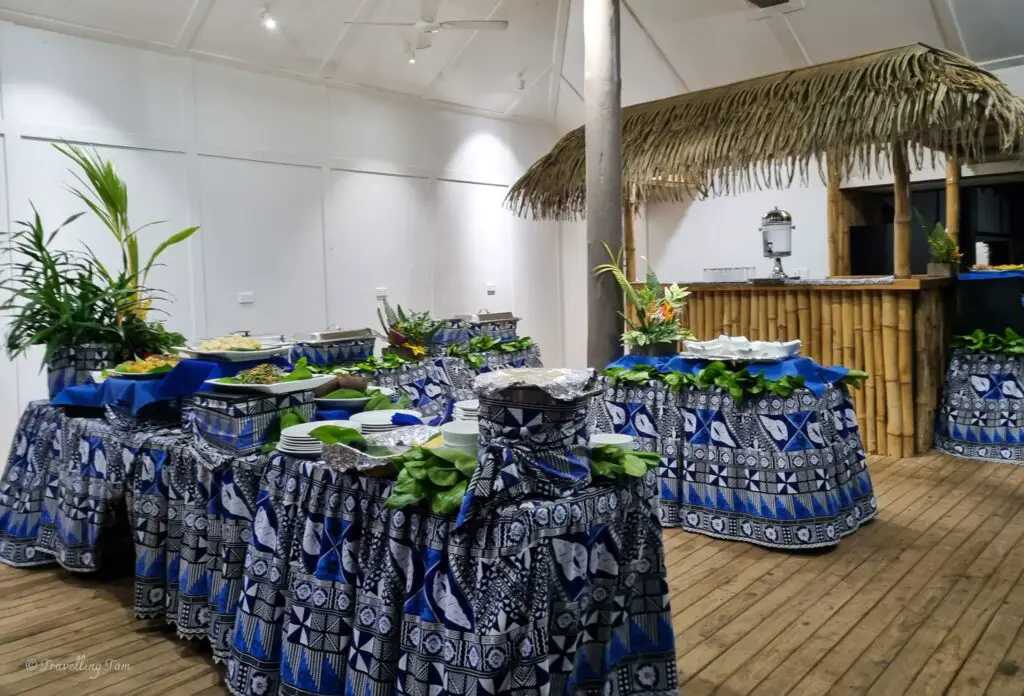
One cost you should factor into your budget (if you have one!) is a daily mandatory meal plan. It’s common on many of the island resorts, and it will not be included in your nightly accommodation rate.
A meal plan is often a buffet breakfast, and a set lunch and dinner, commonly chosen the night before from a small selection. Usually there’s a meat, vegetarian or fish dish.
Meal plans usually cost around $119 per day and you are required to pay this upon check out. It does not include drinks so you’ll need to buy your own soft drinks or alcohol on top.
On the mainland of Viti Levu, like on Wailoaloa Beach, meal plans are less commonly enforced and you are free to choose to dine wherever you wish.
You have to understand that many resorts are privately owned and are the only accommodation on the island (or at least they are far away from other places). There’s often nowhere else to go anyway so it makes sense that you stay at the resort and eat at their restaurant on a schedule that works for them. It’s actually really nice to see all guests coming together for meals, like a big family!
This is definitely one of the more useful things to know before visiting Fiji, especially if you’re on a tight budget.
3. Wifi is generally poor (and power cuts common) on many islands
Generally the Wifi in most populous places in Fiji is good, however the more remote you go, this may not be the case.
On some of the Yasawa Islands I went to, there were multiple power cuts meaning of course no WiFi for long periods of time. That’s totally not a big deal if you’re on holiday, but not so great if you are working remotely, like many people I met there!
If you need reliable WiFi during your visit to Fiji, I would advise you to make provisions like bringing your own dongle.
4. Cash is the preferred currency (and ATMs are scarce)
In Fiji, cash is most definitely king. You’ll face large fees every time you make a card purchase in most places in Fiji. Typically this is 2-5% of the total spend amount. This really adds up!
To avoid paying double fees (i.e. fees from your bank also) if you do want to use a card, I would recommend the Wise App. Top it up in your home currency and then convert it to Fijian Dollars in a few clicks before you go. If you use my link, you’ll get your first $1,000 transfer fee free.
You can also convert any foreign cash currency into Fijian Dollars from the Bureau de Change at the airport on arrival. But as always, rates are rubbish, so avoid this if you can.
ATM’s are generally scarce or non-existent on many of Fiji’s islands. So you will need to have cash.
If you arrive into Nadi airport, there are Westpac ATM’s in the airport lobby, once you have exited through security. I would recommend drawing out all, or the bulk of what cash you think you need initially here, or at an ATM in the town.
Of course, always remember to split any cash up between bags and wallets for security.
5. Dive safely – there’s limited specialist health care
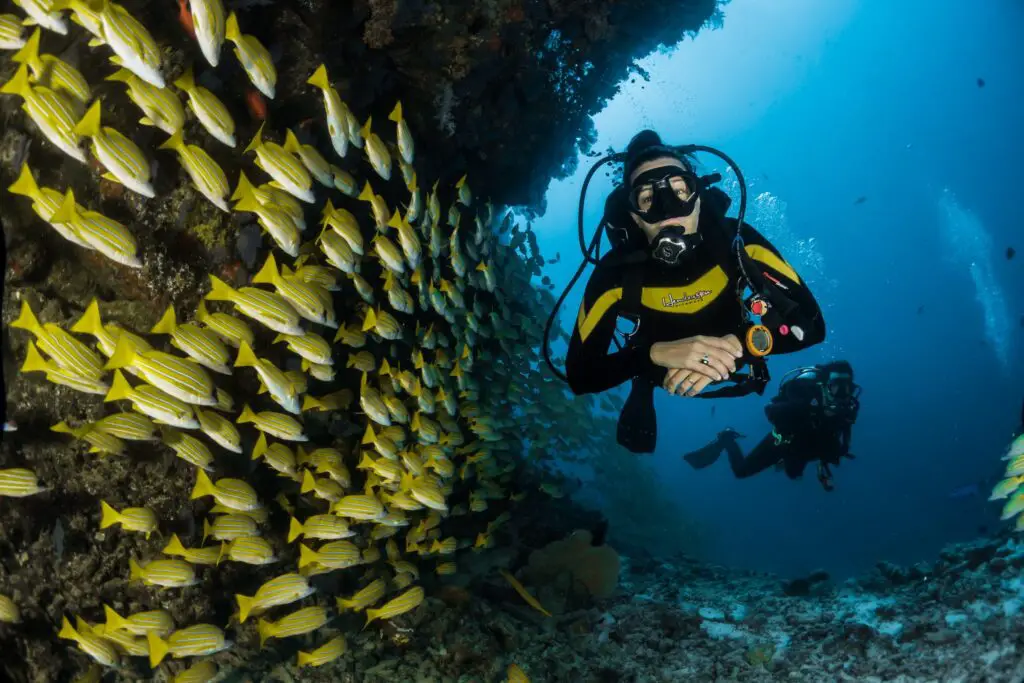
It’s important to know if you plan to dive, or will be undergoing a diving course, that there is only one hyperbaric decompression chamber in the whole of Fiji, located in the capital, Suva.
If a diver surfaces too quickly, not following the correct procedures for surface intervals, nitrogen bubbles can form in their tissues and bloodstream. This is otherwise known as getting ‘the bends’ and can be fatal if not treated promptly in a decompression chamber.
This should by no means put you off diving because Fiji is world-class for it. You should just be aware there is only one of these facilities in the whole country. You and whomever you dive with should be extra conscious of following the correct procedures.
6. Solo travellers are welcome (kind of)!
Fiji is a fantastic family-friendly destination as children and families are important to the Fijian culture, but surprisingly there is a solo travel scene in Fiji too!
Fiji is a great place to travel solo BUT only if you know where to go. The Yasawa Islands, Mamanuca Islands and the Coral Coast are popular places for solo travellers. Some islands and hotels are targeted towards honeymooners and couples though, so avoid those.
Although I didn’t experience this myself or heard of anyone who had, there are rumours of some hotels having a single’s surcharge. This means you could pay extra for staying at a resort alone. Why, I have no idea!
This being said, myself and many other solo travellers I met were made to feel very welcome, but it’s worth keeping an eye out for this surcharge if you’re planning on heading to Fiji alone.
7. Many islands have no shops (so bring your ‘can’t live withouts’)
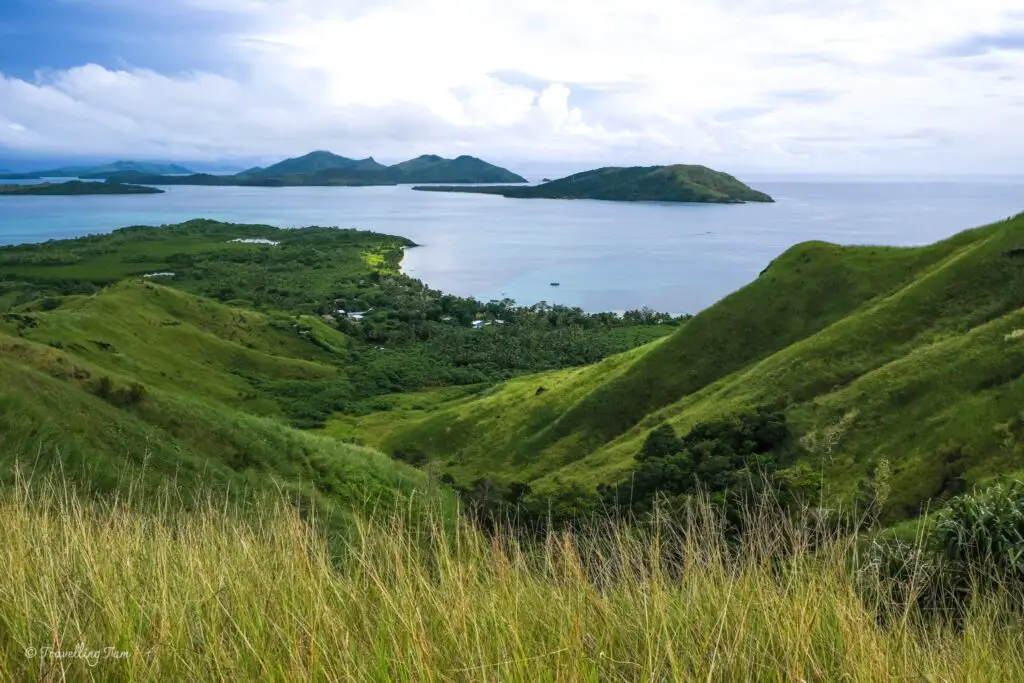
As mentioned in point two, many tourist islands off the mainland are privately owned by resorts or communities and import their goods. They do not necessarily have village stores or shops.
This being said, if there are certain snacks, toiletries or items you can’t bear to be without on holiday, make sure to bring them with you.
You can of course buy some of the most basic essentials like mosquito spray, sunscreen etc from your hotel, but the supply and brands will be limited.
8. Bring a gift when you visit villages
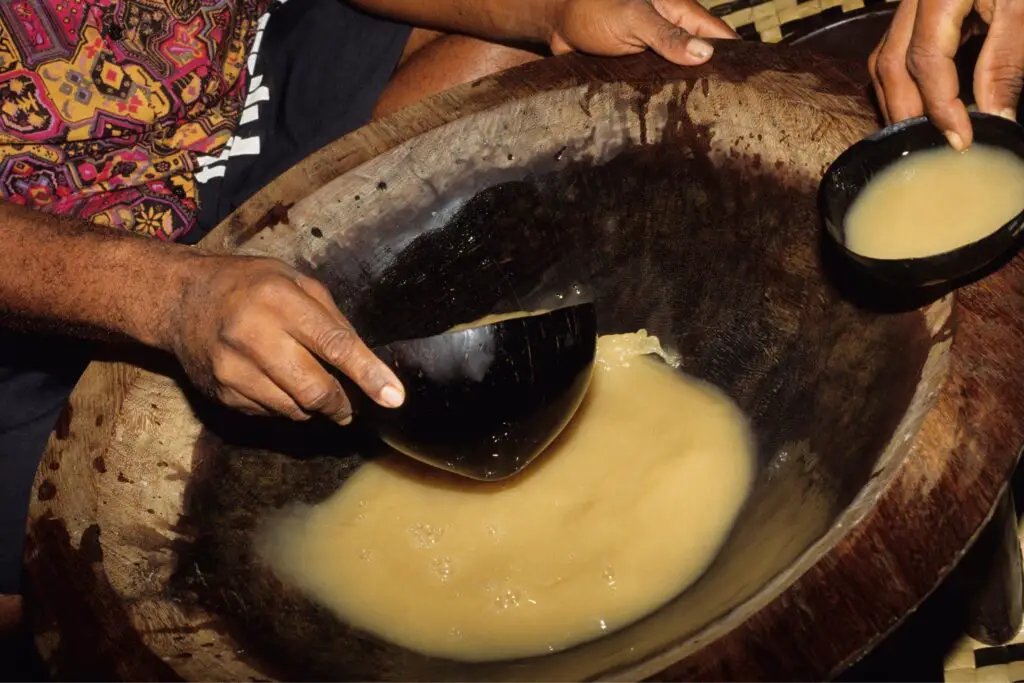
Are you planning a local village visit or want to explore somewhere on a community’s land (such as a waterfall)? Well, you’re likely to be expected to take part in a sevusevu (gift-giving ritual) so you must bring a gift.
This can be something you buy if Fiji though, and it doesn’t necessarily have to be something you bring with you from home. Your accommodation staff will be able to help advise you what is best to buy. Typically it’s kava roots .
As part of the sevusevu ceremony, the Village Chief, the Turaga ni Koro, will officially welcome you to the community with Kava, a muddy-tasting watery drink made from the Piper methysticum plant.
Entering a community without a sevusevu is trespassing and considered rude. This is an important thing to know about visiting Fiji, to ensure you respect the local customs.
9. Prepare yourself for ‘Fiji Time’
Fiji time is the affectionately known term for the Fijian’s relaxed attitude to a schedule and timings. Things may not always run on time or be as efficient as you would expect at home, but that’s OK, keep calm, it’s all part of the experience.
That being said, every tour or bus/ferry pickup I personally experienced on Viti Levu and the Yasawa Islands was extremely punctual! It was more of a joke than an actual experience.
Tourism is such a big part of the economy in Fiji so I do think everything is well thought out and organised in general. I experienced fantastic services all round and I can’t say I ever encountered any delays or inconveniences.
Either way, prepare for it, and you may, like me, be pleasantly surprised!
10. Fijian food is delicious (& dietary requirements are catered for)
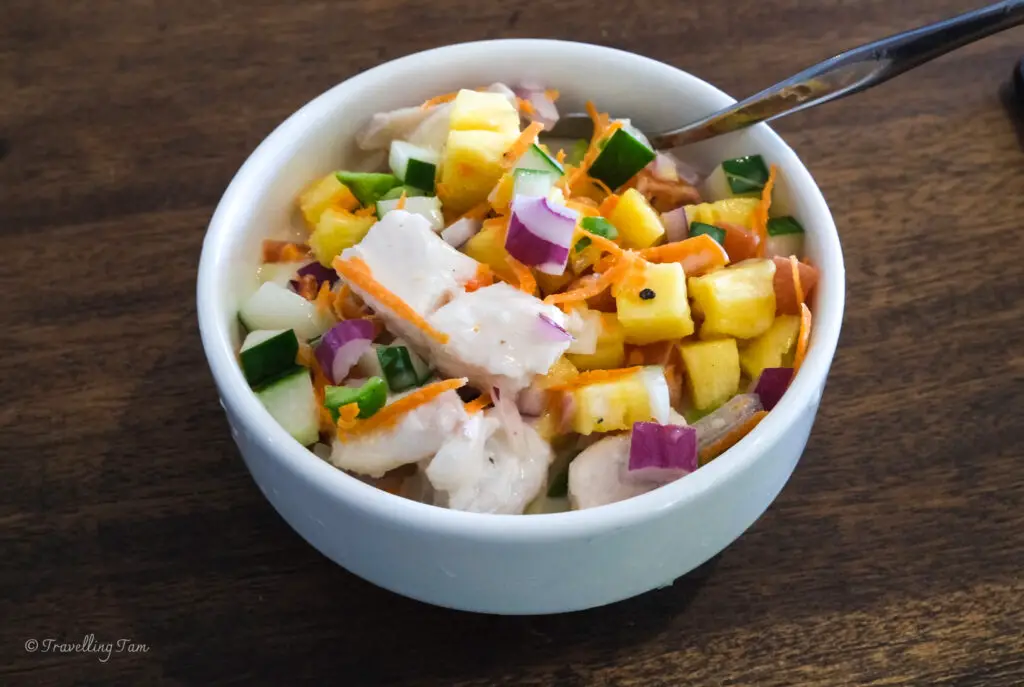
As a pescatarian, I knew going to a country of islands meant I was going to eat some really good fish and seafood. But then again, there’s only so much fish you can eat so I was keen to know if there was good vegetarian food too (or whether I needed to stock up on noodles in my hand luggage!)
Luckily, even if you’re at accommodation with only set meal plans, there will always be a good vegetarian option, like a curry. If you’re fortunate, you may experience a traditional buffet where you’ll be spoiled with lots of vegetarian dishes.
Indo-Fijian cuisine is also stand-out. If you can get your hands on some authentic street food (meat or vegetarian) – absolutely do! There’s delicious curries, rotis and dahls (again with a Pacific twist) to enjoy during your trip to Fiji.
If you have any dietary requirements or food allergies you don’t need to worry. They are noted with care by staff who will ensure you’ll be accommodated (and happy with your meals!)
11. You can be active in Fiji too
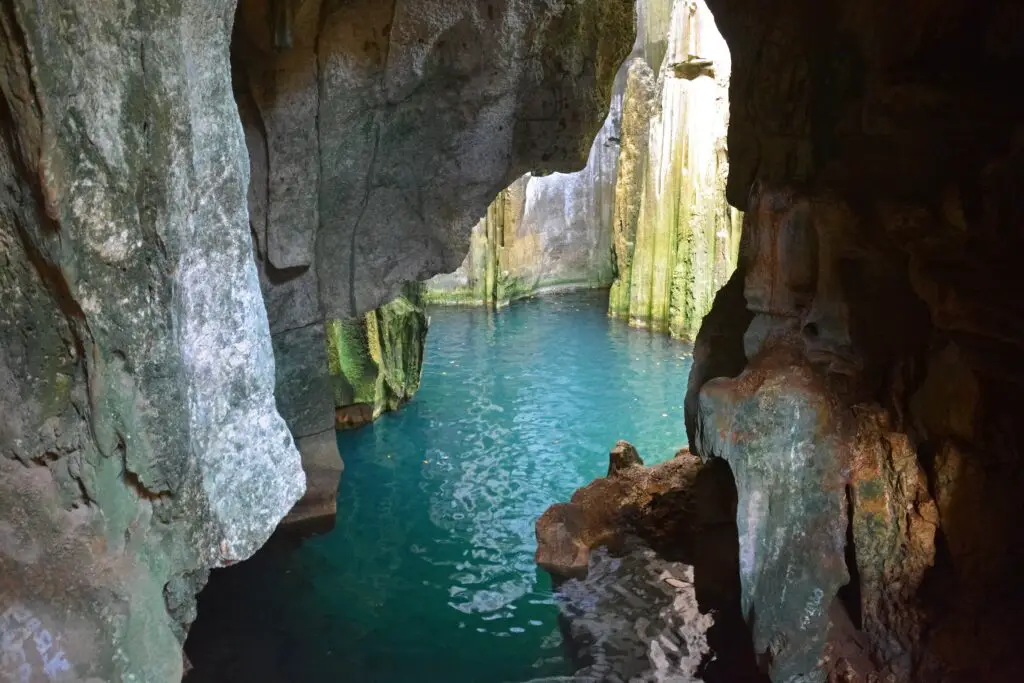
I know, the image you have of Fiji is likely an idyllic scene of relaxing by the pool or on a white beach under palm trees. Yes, you will most likely be doing quite a bit of chilling, but Fiji does have an adrenaline-inducing adventure travel scene too (albeit a small one)!
From swimming through underwater channels into dark chambers at the Sawa-i-Lau Caves to zip lining in Viti Levu, snorkelling with wild manta rays and hiking for sunrise, Fiji does offer some super fun active things to do as well. Don’t be put off!
Make sure you take advantage of your accommodation’s recommended activities or discover some interesting group tours in Fiji via Viator.
12. You don’t need a visa (from many countries!)
It’s a relief to know that citizens from certain countries don’t need a tourist visa to visit Fiji. That includes citizens of Australia, New Zealand, the UK, Canada or the United States.
See the Fiji Immigration website for more information on exact country inclusions and exclusions.
You do however need to have an onward or return ticket and a valid visa for the next country you’re travelling to.
Fiji is only about a 2 hour flight from New Zealand and 4 or so hours from Australia. Considering there’s no other paperwork than your tickets required, if you’re based in Oceania, it’s a really convenient holiday option!
13. English is widely spoken
Fiji has three official languages: English, Fijian and Fiji Hindi. 54% of the Fijian population who are native, speak Fijian as their first language.
However, being a country that is so reliant on tourism, English is widely spoken as either a first or second language. You’ll have no problem communicating whatsoever.
Just make sure you learn a few basic words like “Bula” (hello) and “Vinaka” (thank you), which you’ll hear a lot during your trip to Fiji! And if you’re into languages, anything more you can learn will always be appreciated!
14. Sundays are for church and resting
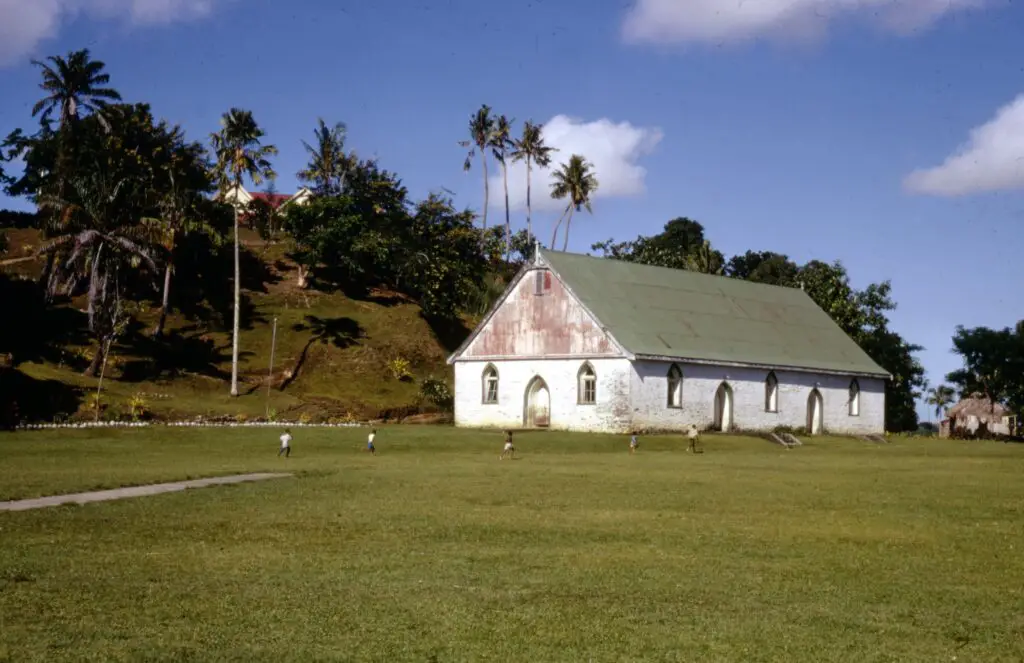
Despite Fiji being an ethnic melting pot of different races, religions and cultures, typically Sundays are for going to church and/or spending time with family.
You will notice that many shops and tours do not operate on a Sunday so you should not expect to do much on this day of the week.
This is something to be aware of when booking transport too. Sometimes buses and ferries don’t run which can be a pain if you have a tight island-hopping itinerary, for example. Be sure to always check that you can make it somewhere on transport before you book accommodation for the night, just in case you have to change your plans!
If you are visiting or staying in a village on a Sunday, you should dress smarter than normal. You may also be expected to wear a sulu (a skirt-like garment worn by men and women which was introduced in the 19th century).
15. Avoid visiting Fiji these two months!
Fiji can get really busy in June and July which are the peak months for tourists from Australia and New Zealand, especially families. Prices are often inflated during this period and you may have limited options for accommodation, unless you book well in advance.
The dry season is May – October and the wet season is actually the summer (November – April), but when you can expect biblical downpours. It’s also worth being aware that cyclones are common December – April.
A good time of year to visit Fiji is towards the end of April – May and August-October, if you can wrangle it.
Before you travel to Fiji, it is important to check the most up-to-date information on the Smart Traveller website. It should be your go-to resource for the most important things to know before visiting Fiji, such as any extreme weather warnings, breaking health news and more.
I always try to keep my posts as up-to-date as possible, but please do not take my personal experiences as gospel, and instead check official channels.
Fiji is a fantastic holiday destination that will absolutely relax and rejuvenate you. I hope these tips have been useful considerations before you visit Fiji!
More posts about Fiji:
- Is Fiji A Good Destination For Solo Travel?
- Swimming With Majestic Manta Rays In Fiji
- What It’s Like To Travel To Fiji In 2022
- A 10 Day Yasawa Islands Itinerary
- Staying In A Treehouse Bure In Fiji
Going to Fiji Soon? Don’t forget these essentials!
Flights: compare and search for the cheapest flights using Skyscanner
Accommodation: hotels to hostels, glamping to apartments, I always use Booking.com
Tours: to find the best group tours and activities (with up to 20% off), use Viator
Visa: don’t forget to check the entry requirements for the passport you are travelling with on the Fiji government website
Inspiration: how about Lonely Planet’s Guide to Fiji, or to kick-start your next adventure, Lonely Planet’s top 500 places to see… ranked?

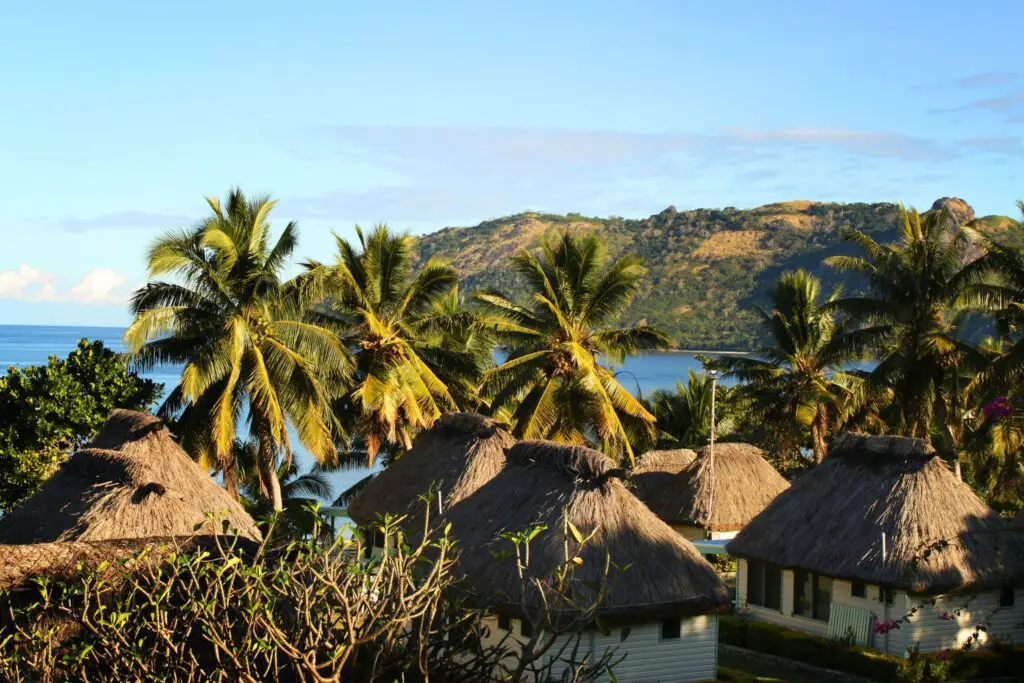




I’m also a pescetarian! Great to know that Fiji will have lots of delicious things for me to eat when I get a chance to visit! 😀
Absolutely! Lots of delicious fish curries, grilled fish and fish & chips is quite common too haha. But lots of good veggie stuff as well. The food in Fiji surprised me!
These tips are excellent! It’s always good to know when you need to carry cash — and if the WiFi is weak, in case you need to check in with people back home. Really great advice, thank you!
I’m glad you think so, thanks Samantha 🙂
Great travel tips! I always appreciate tips about the WIFI. Especially since i always work a bit when traveling!
Yess I think a few people wish they knew that too when I saw people experience a power cut in the middle doing work for a tight deadline haha!
I liked hearing about the concept of Fiji time. I’ve also been to 35 countries, but haven’t been to Fiji yet. I would love to go there some day. Thank you for the great guide.
I hope you get to make it! It really is a warm and welcoming place and I left feeling a million times lighter and more relaxed!
Fiji sounds and looks like paradise! Great guide on what to expect before visiting. I would love to explore this area.
It’s pretty much as close as you can get haha! And thank you 🙂
Fiji looks like an absolute dream! It’s on my bucket list but I haven’t researched it much. Thanks for the tips, I’l save this for a future trip!
Great to know, thanks Nikki 🙂
Helpful tips for visiting Fiji, Thank you! I’ve toyed with the idea for a while and Fiji is creeping up my list! I’ll save this article for later!
Great, I hope you get to visit sometime soon and this will be useful prep for when you do! 🙂
The meal plan seems a bit pricey, BUT the added convenience of not having to go somewhere and figure out dinner is always a plus since we are a bigger family. Plus if it’s the only place to eat anyway, then it totally makes sense!
Yes I thought the same. Initially I was a bit peeved, but it makes sense and is actually a very efficient way of doing things!
Fiji sounds so charming, but sadly so remote! I am dreaming visiting and having an unforgettable life experience! I would particularly love to visit the villages I didn’t know that power cuts were so frequent though!
Certainly not *too* remote, but that’s also it’s charm. You do feel like you get away. Village visits are definitely a highlight!
Love this guide, I have been to Fiji so many times but still learnt so much. Especially about the single surcharge! I think that’s crazy
Ah that’s cool, thanks for letting me know! I know, as I said, I didn’t encounter it, but I met someone who did which is quite weird!
So, so handy Tam! Am off to Fiji in a few weeks – first time I’ll be using my passport in a while! Thanks for sharing these tips.
Aw get that bad boy dusted off!! I really can’t wait to hear about it afterwards – have a wonderful time!